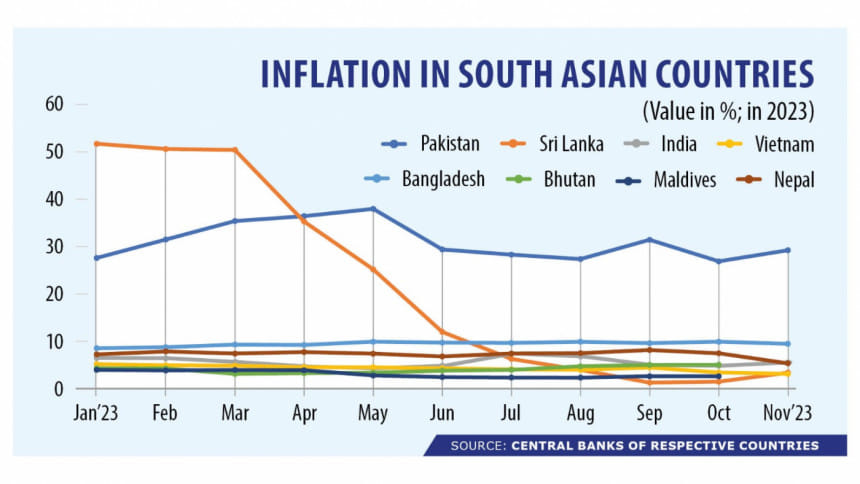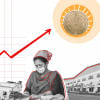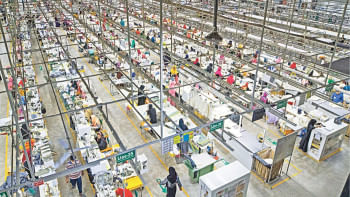South Asian nations succeeded in taming inflation. Bangladesh, not so much

Most South Asian countries succeeded in reining inflation in 2023 in a major relief for their populations who struggled after prices spiralled owing to the shocks stemming from the lingering impacts of the coronavirus pandemic and the Russia-Ukraine war.
Even, Sri Lanka that witnessed its worst economic crisis since its Independence brought down consumer prices following an unprecedented spike.
However, Bangladesh, like Pakistan, is still finding it difficult to contain higher inflation. The country witnessed an average increase in the Consumer Price Index (CPI) of 9.42 percent in November, highlighting the challenges experienced by most of the population in the lower-middle-income nation.
And the higher level of inflation persists although the global price of various commodities has fallen in recent months.
In Bangladesh, inflation has accelerated in the past one and a half years owing to a mixture of external and internal factors.
The external factors include supply chain disruptions following Russia's invasion of Ukraine and higher commodity prices. Domestic factors include a 28 percent depreciation of the taka against the US dollar since February last year, and persistent foreign currency shortages, driven by a 30 percent drop in the reserves, leading to import restrictions.
Several economists and analysts blame the central bank for not using monetary tools like the way other central banks across the world did. The government's delayed response also drew criticism since it did not ensure an adequate supply in the market.
A Daily Star analysis of the CPI data of South Asian countries showed that Sri Lanka's inflation has plunged while Pakistan's consumer price remains flat at 30 percent.
Prices dropped in India, Bhutan, the Maldives, and Nepal. Afghanistan's inflation slipped to the negative territory.
In January this year, Sri Lanka witnessed an inflation of 51.7 percent and it was 73 percent in September 2022.
The Island nation managed to bring it down to 3.4 percent in November, according to the Department of Census and Statistics. The International Monetary Fund (IMF) attributed responsive monetary policy, strong base effects, weak demand, an appreciating rupee, and muted second-round effects for the decline.
Pakistan's CPI fell to 29.23 percent last month from a 12-month high of 37.97 percent in May, data from the central bank of the country showed.
Thanks to appropriate policy measures, India's brought down inflation to 5.55 percent in November from 6.52 percent in January, while it fell to 5.38 percent in Nepal from 7.26 percent in January.
The Maldives reported inflation of 2.64 percent in October from 3.99 percent in January. Bhutan experienced a small spike as inflation rose to 5.07 percent in October from 4.99 percent in the first month of 2023.
"Bangladesh's policymakers took too long to respond to inflationary pressures," said Zahid Hussain, a former lead economist of the World Bank Bangladesh.
"As a result, an elevated level of inflation existed in both urban and rural areas throughout the year."
The central bank started monetary tightening in July this year although inflation has been at a higher level since June last year. It stepped up its efforts in October.
In November, the central bank raised the repo rate -- the rate at which the BB lends money to commercial banks and financial institutions -- by 50 basis points to 7.75 percent to make loans costlier and give better returns to savers.
This was the eighth hike since the start of the tightening cycle in May 2022.
A day after hiking the policy rate, the central bank also increased the lending rate to tame the skyrocketing inflation. But the 9 percent cap on lending rates between April 2020 and June this year kept the hike in the policy rate largely ineffective.
Fahmida Khatun, executive director of the Centre for Policy Dialogue, said, "While many countries have managed to reduce inflationary pressures by using the monetary tools, Bangladeshi policymakers have shied away from doing the same."
Zahid Hussain described the BB measures as "too little and too late."
He pointed out that the government financed the budget deficit by borrowing money from the BB. He likens it to printing money.
He also blamed the big market players for supply-chain disruptions.
"Big players in the food supply chain misused the market power to gouge prices evading the watch of the regulators. Import controls and dollar shortage also inhibited supply."
"The shortage of foreign exchange continued as did the opportunistic use of the market power in the markets of essential food items."
The central bank has moved towards a market-driven lending rate by withdrawing the lending rate cap. But Fahmida says monetary policies will not work properly if the fiscal policy is expansionary.
"There should be coordination between monetary and fiscal policies."
Selim Raihan, executive director of the South Asian Network on Economic Modelling, a think-tank, said: "None of the steps taken so far to control inflation are working since the decisions have come belatedly and taken a while to implement."
He also said only implementing monetary policies is not enough as fiscal policies play a big role.
Raihan said the lack of proper market management has been one of the main reasons for the escalated inflation.
According to a report of the IMF, the pass-through of the sharp depreciation of the local currency accounted for half of the inflation surge seen in Bangladesh in the last financial year of 2022-23.
It said the gradual pace of the monetary tightening appears to not be enough to stem the second-round inflationary pressures.
"A further tightening of the monetary policy stance is needed to bring inflation to the authorities' target range over the medium term."
Inflation is expected to ease in the coming months on continued contractionary monetary policy, measures taken to secure a market-based exchange rate, lower global commodity prices, and a better crop outlook, according to the Asian Development Bank.
Recently, BB Governor Abdur Rauf Talukder said inflation would come down to 6 percent by June.

 For all latest news, follow The Daily Star's Google News channel.
For all latest news, follow The Daily Star's Google News channel. 








Comments